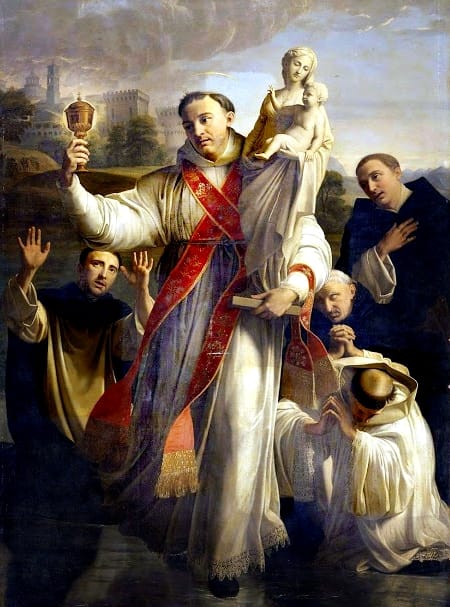St. Hyacinth of Poland was born in 1185 in what was then Upper Silesia (today modern Poland). He was a relative and possibly the brother of Blessed Ceslas Odrowaz.
St. Hyacinth was educated in both law and Sacred Studies and studied in the illustrious cities of Krakow, Prague, Paris, and Bologna. Despite his education, he was first and foremost a holy priest. After his ordination to the Sacred Priesthood of Jesus Christ, he worked to reform convents in his native country.
While on a trip to Rome with Bishop Ivo Konski, his uncle, he witnessed the glorious Patriarch St. Dominic perform a miracle that changed his life. He became a personal friend of St. Dominic and then one of the first Dominicans. In fact, he was the first Polish Dominican and he brought the Order to Poland. He was prolific in his work, evangelizing throughout Poland, Pomerania, Lithuania, Sweden, Norway, Denmark, Scotland, Russia, Turkey, and Greece.
During an attack on a monastery, Hyacinth managed to save a crucifix and statue of Mary, though the statue weighed far more than he could normally have lifted; the saint is usually shown holding these two items. Hyacinth never served as provincial nor even a prior, but toiled as a simple friar, focusing on the internal and external missions facing the Polish Dominicans: to deepen their own faith, and to spread it through Poland.
Traditional Matins Reading:
Hyacinth was a Pole and born of noble and Christian parents in the town of Camien of the diocese of Breslau. In his childhood he received a liberal education, and later he studied law and Divinity. Having become a canon of the church of Cracow, he surpassed all his fellow-priests by his remarkable piety and learning. He was received at Rome into the Order of Preachers by the founder St. Dominic, and till the end of his life he observed in a most holy manner the mode of life he learnt from him. He remained always a virgin, and had a great love for modesty, patience, humility, abstinence and other virtues, which are the true inheritance of the religious life.
In his burning love for God he would spend whole nights in prayer and chastising his body. He would allow himself no rest except by leaning against a stone, or lying on the bare ground. He was sent back to his own country; but first of all on the way there, he founded a large house of his Order at Friesach, and then another at Cracow. Then in different provinces of Poland he built four other monasteries, and it seems incredible what an amount of good he did in all these places by preaching the Word of God and by the innocence of his life. Not a day passed but he gave some striking proof of his faith, his piety, and his innocence.
God honoured the holy man’s zeal for the good of his neighbour by very great miracles. The following is one of the most striking: he crossed without a boat the river Vistula, which had overflowed, near Wisgrade, and drew his companions also across on his cloak which he spread out over the water. After having persevered in his admirable manner of life for forty years after his profession, he foretold to his brethren the day of his death. On the feast of our Lady’s Assumption in the year 1257, having finished the Canonical Hours, and received the sacraments of the Church with great devotion, saying these words: 'Into Thy hands, O Lord, I commend my spirit,’ he gave up his soul to God. He was illustrious for miracles in death as in life, and Pope Clement VIII numbered him among the saints.
Prayer:
O God, Who sendest us joy year by year on the feast of blessed Hyacinth, Thy Confessor, which we are now keeping: mercifully grant on this day of his heavenly birth that we may grow like him in deed. Through our Lord.
Prayer Source: 1962 Roman Catholic Daily Missal








0 comment(s):
Mag-post ng isang Komento